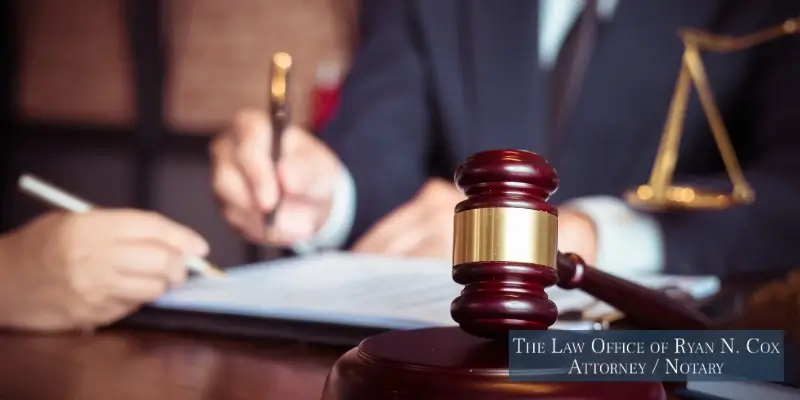Jefferson Parish Expungement Lawyer
Jefferson Parish Expungement Attorney

The criminal justice system can leave a lasting mark on an individual’s life. Expungement can help individuals move past their criminal record. To learn more about expungement, who qualifies, and how it could affect your future, consider working with a Jefferson Parish expungement lawyer.
A Jefferson Parish criminal defense lawyer can guide you through the expungement process and help you clear your record. Take the first step toward a fresh start today.
Developing Effective Strategies
Having served as a prosecutor before moving to defense work, the founding lawyer of The Law Office of Ryan N. Cox brings valuable experience to our clients’ cases. Our extensive knowledge of the criminal justice system allows us to guide our clients through each phase of the expungement process. We focus on transparent communication and personalized attention. Let us do the heavy lifting and fight for a positive solution.
Whose Record Can Be Expunged?
Louisiana’s expungement laws set clear rules for who qualifies. The type of crime and the outcome can both impact your eligibility for expungement. Another important factor is timing. Louisiana law requires individuals to go through a waiting period before applying for expungement, which is usually at least a few years after completing their sentence.
This waiting period applies to misdemeanors and some felonies and can give the authorities time to review the applicant’s attempts at rehabilitation.
In order to apply for expungement, individuals have to satisfy all the sentencing requirements based on the details of their arrangement. This could include completing probation, paying any fines owed, and meeting other conditions imposed by the court. Fulfillment of these obligations can show the court that the applicant is responsible and interested in changing the trajectory of their future.
The Expungement Process
Expungement usually follows a specific structure. Individual steps can vary, but overall, the process includes a set course of action:
- Filing a Petition: To start, the individual seeking expungement has to file a petition with the court, giving them details on their criminal record. There are certain guidelines and forms that must be completed with this process in order for the application to be reviewed.
- Checking Eligibility: Once the petition is filed, the court reviews the individual’s eligibility. They confirm that the criminal history is correct and whether they have finished their sentencing and any additional requirements.
- Notifying Agencies: Either the court or the individual’s attorney lets government agencies know about the expungement petition to address the official records. Usually, local law enforcement and the Department of Public Safety are notified, along with any other relevant departments.
- Court Hearing: If it is required for a particular case, the court might hold a hearing. This hearing gives both the petitioner and any potential objectors a chance to present their arguments as to why expungement should or should not take place. The judge considers all the perspectives given in the hearing before making a final decision.
- Final Order: If the judge approves the expungement, they issue a court order to remove the record from public view. This order is followed by the relevant departments, finishing the expungement process.
An attorney might be needed to begin and navigate the process of expungement. They can make sure everything is turned in on time and that you attend all required hearings.
Pros and Cons of Expungement
Getting your record expunged can open up employment and housing opportunities. If a background check is done on you, expunged records usually do not appear, which can give you a fairer chance for stable work. It can also increase your options for housing with landlords and property management companies that run background checks.
Beyond the tangible benefits, an expungement could also reduce anxiety about the future and lower the stress surrounding a criminal record; however, there are limits. Not all crimes qualify under Louisiana law. Police and other government agencies can still preview expunged records for ongoing investigations. Although expungement provides privacy, it doesn’t get erased completely.
The expungement process itself can be complicated. Detailed paperwork and strict filing rules make legal guidance valuable. Inaccurate or incomplete filings can cause delays or even lead to an outright denial, so it’s important to prepare carefully.

FAQs About Jefferson Parish,LA Expungement Law
Who Qualifies for Expungement Under Louisiana Law?
Whether an individual qualifies for expungement under Louisiana law depends on the individual’s criminal record and the outcome of their case. People who were arrested but not convicted, participated in a pretrial program, or were convicted of a smaller offense might qualify for expungement. To qualify, they must have finished their entire sentence, including probation, fine payments, and community service or other programs.
Can All Types of Convictions Be Expunged in Louisiana?
Not all types of convictions can be expunged in Louisiana. Certain misdemeanors might qualify, but not all felonies are eligible. Serious convictions for violent crimes or sex offenses usually cannot be expunged. Other felony convictions might qualify under specific conditions, including the amount of time that has passed between the sentence and the expungement request. These rules can help maintain public safety and provide an individual with the opportunity for a fresh start.
Does Expungement Completely Remove a Record From Public View?
Expungement does not completely remove a record, but it does keep it hidden from the public. If a record is expunged, most employers and landlords cannot see the record if they conduct a background check. There are certain groups like law enforcement and government agencies that can see expunged records, but they can only view them for specific legal purposes on an as needed basis.
How Does Expungement Differ From a Pardon in Louisiana?
Expungement differs from a pardon in Louisiana due to the types of relief they offer. While expungement seals the record from public view, a pardon is more of a forgiveness. Members of the public cannot view an expunged record, but they can see a pardon. A pardon serves as a formal restoration of civil rights like voting. The governor issues pardons, but the expungement process goes through the courts.
Regain Control of Your Life With the Help of an Expungement Lawyer
Getting your record expunged can provide you with a second chance and help pave the way to new opportunities. Schedule a consultation with The Law Office of Ryan N. Cox to start exploring your options and working towards a brighter future. Whether it’s about securing employment, housing, or simply a sense of freedom, expungement is an important step in the process.


